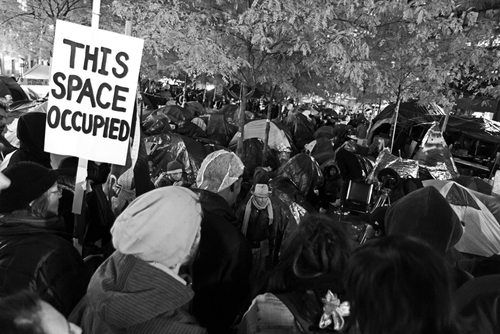
Marcio Jose Bastos Silva / Shutterstock.com
October 5, 2012; Source: The Guardian
Has the Occupy movement run its course? Writing for the Guardian in the U.K., Giles Fraser takes on Archbishop Rowan, head of the Church of England, for his critique that the Occupy message was “so general as to be undemanding.” Fraser responds by comparing the Occupy movement to the Chartist movement of the mid-18th century, which demanded electoral reform in England. He quotes critics of the Chartists describing them similarly to how critics have characterized the Occupy movement: “wild, inarticulate souls … unable to speak what is in them” according to Thomas Carlyle, or “a company of seals” in the words of Charles Kingsley. A movement that had largely petered out by 1848, the Chartists were dismissed, much like the Occupiers, as muddled, motley, and sometimes incoherent.
Sign up for our free newsletters
Subscribe to NPQ's newsletters to have our top stories delivered directly to your inbox.
By signing up, you agree to our privacy policy and terms of use, and to receive messages from NPQ and our partners.
However, the Occupiers largely had a generalized critique of inequality and, at least in the U.S., tended to eschew specific policy proposals. The Chartists actually had a relatively specific set of demands; they might have sounded incoherent to the British Parliament of the early 1800s, but these demands seem to be the pillars of the democracy that Britain evolved into, including universal male suffrage, secret ballots, no property qualifications for members of Parliament, salaries for members of Parliament (to make it possible for poor people to serve), constituencies of equal size, and annual Parliamentary elections. Although these reforms weren’t achieved during the time of the Chartists, five of these demands are embedded in the British electoral system of today. Those demands sound pretty coherent to us.
Although the remnants of the Occupy movement are a bit sparse, Occupiers still seem to be popping up for various localized protests. In Portland, Ore., Occupy Portland is still struggling against the city’s anti-camping ban, which the Occupiers describe as not only harming their protests, but harming homeless people. In Los Angeles, there is something of an Occupy protest continuing, though like the Portland movement, there is a sense that there is an overlap between the Occupy protesters and the homeless in Pershing Square.
Prompted by the Canadian magazine Adbusters, which helped launch the Occupy Wall Street movement a year ago, Occupiers seem to be heading to Washington, D.C. to congregate on Capitol Hill on Halloween. DCist quotes Adbusters advising Occupiers, “Let’s all go to Washington, D.C., and have a Halloween night party! Let’s celebrate the wonderful Coke/Pepsi presidential election now in progress … and the honest, feisty way our elected reps in Congress have conducted our nation’s business … pay tribute to the bold visions they’ve put forward.” Meanwhile, some people under an Occupy D.C. banner reportedly began a small campsite at D.C.’s Freedom Plaza, which they renamed “Bradley Manning Freedom Plaza” after the U.S. soldier charged with revealing classified information to WikiLeaks.
The common wisdom dismisses Occupy as having always been marginal or somewhat silly. To us, it seems like the Occupiers have devolved into a community of protesters who protest, who find community in their common though somewhat inchoate opposition to mainstream society, top to bottom. A strain of anarchism shows, partly in their political line, partly in their style of protest. But aside from an article here or there (such as this fabulous read in Rolling Stone about the Occupy Cleveland five), few pundits continue to explore exactly what Occupy was, is, and might be in the future. —Rick Cohen













